
COVID-Blog
Devising mechanisms for home delivery of HIV treatment in Lao PDR
17 April 2020
17 April 2020 17 April 2020In order to mitigate the impact of the lockdown on HIV services, the Centre for HIV/AIDS and STI under the Ministry of Health requested UNAIDS to support the development of a concept note to establish a mechanism of home delivery to provide HIV treatment to people living with HIV who are not able to go to the healthcare facilities due to restriction in movements imposed by the government.
UNAIDS worked with two civil society organizations—Lao Positive Health Association and the Association for People Living with HIV (APL+)—to find a workable approach for the provision of ARV drugs.
As a result, the two civil society organizations are now working, under the umbrella of the Ministry of Health, with 11 health facilities throughout the country to ensure 839 people living with HIV receive their treatment at home or at a specified location of their convenience.
Community members together with healthcare staff at health facilities reviewed the list of people living with HIV who had appointments with doctors scheduled for April 2020—the lockdown period established by the government. The list helped identify the areas, treatment and budget needed for the home delivery initiative. Community members would then get an authorization letter to travel around their province ensuring treatment continuity.

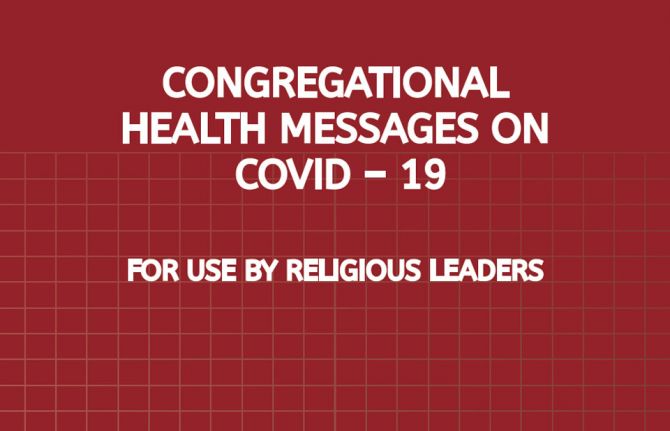
COVID-Blog
Congregational health messages on COVID-19 for religious leaders
16 April 2020
16 April 2020 16 April 2020The Government of Kenya in partnership with Faith-based organizations and UNAIDS has produced a booklet for religious leaders in response to COVID-19.
The booklet contains a set of messages to be used during sermons and other religious activities. The messages are intended to provide accurate facts about COVID-19 and debunk myths. They also aim at rallying congregants to respond with love, kindness, and care rather than stigma and discrimination. Finally, the booklet calls on congregants to follow the government guidelines and recommendations on how to prevent COVID-19 infection. The booklet uses Biblical scriptures and quotes from Quran, Hindu, Bahai and other faiths to reinforce the messages.
As a member of the faith sector working group, UNAIDS provided the government and partners with support on the conceptualization and writing of the document including technical review and input.

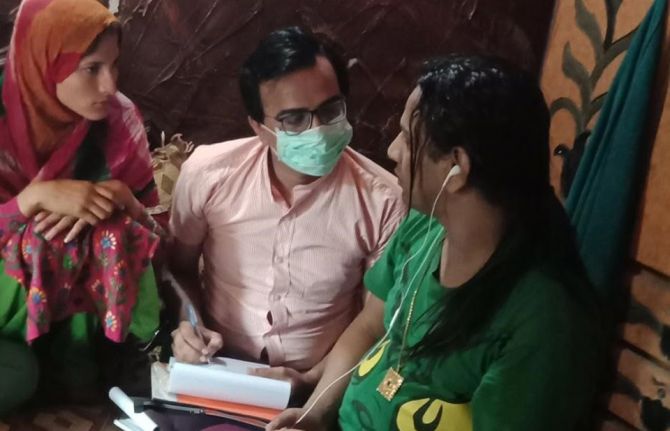
COVID-Blog
Keeping HIV treatment available in Pakistan during COVID-19
15 April 2020
15 April 2020 15 April 2020Since an uninterrupted supply of antiretroviral therapy is essential for people living with HIV, the Pakistan Common Management Unit for AIDS, TB and Malaria, in collaboration with UNAIDS and other partners, has established virtual platforms and helplines in order to ensure that coordination is continued. An emergency stock of antiretroviral therapy has been made available for people living with HIV for the next two months and a buffer stock is being made available through the Global Fund to Fight AIDS, Tuberculosis and Malaria in order to avoid interruptions in the event that imports of medicines are disrupted.
“We are working closely with the Association of People Living with HIV, federal and provincial governments and the UNAIDS family to monitor the situation and quickly help address barriers in accessing life-saving HIV services in these extremely challenging times of the COVID-19 crisis,” said Maria Elena Borromeo, the UNAIDS Country Director for Pakistan and Afghanistan.
Related resources

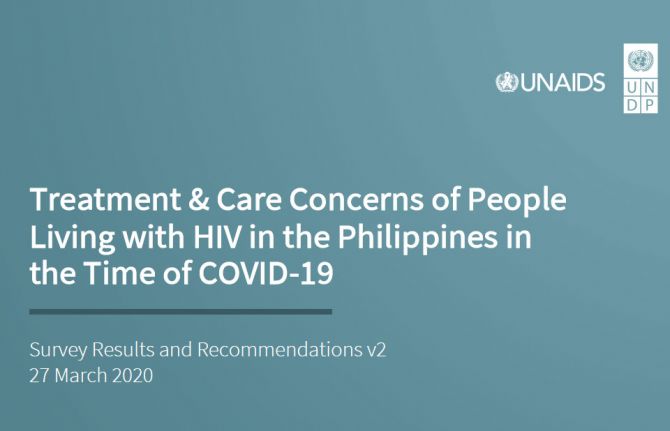
COVID-Blog
Assessing the needs of people living with HIV in the Philippines
15 April 2020
15 April 2020 15 April 2020In the Philippines, UNAIDS and UNDP developed a rapid survey to assess the different issues that are affecting people living with HIV under the enhanced community quarantine due to COVID-19.
Results from the survey show that the suspension of public transportation impacted the most on accessing treatment. While a number of issues were logistics-related, respondents also reported anxiety from loss of income, fears from exposure to COVID-19 while immune-compromised, antiretroviral treatment stockouts, disclosure of one’s HIV status in checkpoints, and the lack of access to psychosocial support, among others.
Based on these results, UNAIDS and UNDP have come up with a set of recommendations that were presented to the Department of Health for timely and appropriate action. The results of the survey magnified the need to develop a comprehensive treatment and care plan for people living with HIV during emergencies and crises, to ensure access to treatment, mental health services, social protection measures and protection of human rights of affected communities.

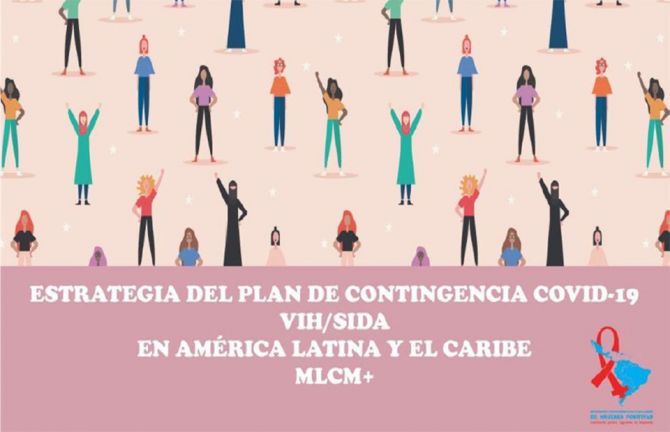
COVID-Blog
A community approach to curb the impact of COVID-19 among people living with HIV in Latin America and the Caribbean
14 April 2020
14 April 2020 14 April 2020The Latin American and the Caribbean Movement of Women living with HIV (MLCM+) with support from UNAIDS conducted a virtual training among community health volunteers from 17 countries in the Latin America and the Caribbean region on how to prevent transmission of COVID-19 and how the new pandemic may have an impact on the quality of life of people living with HIV.
A first capacity building session was held on 09 April 2020 with 350 volunteers from 17 countries in the Latin America and the Caribbean region that will provide information on COVID-19 and HIV-related issues to groups of people living with HIV and other key populations. Other training sessions are planned to happen shortly.
Related resources

COVID-Blog
UNAIDS Executive Director, Winnie Byanyima talks about COVID19
13 April 2020
13 April 2020 13 April 2020UNAIDS Executive Director, Winnie Byanyima participated in a TV special on COVID19 on Sunday 12 April organized by NDTV of India. Ms Byanyima noted that the pandemic is a human crisis of an unprecedented scale that is taking away lives, livelihood, and destroying economies. She called on governments to quickly strengthen their health systems and to begin to trace, isolate and treat all COVID-19 cases.
Asked about the lessons learned from the response to HIV, Ms Byanyima stressed the need to empower communities and involve them in the response to COVID-19; never compromise on human rights; remove all forms of stigma and discrimination; and support vulnerable and marginalized groups.
Watch the full interview here:

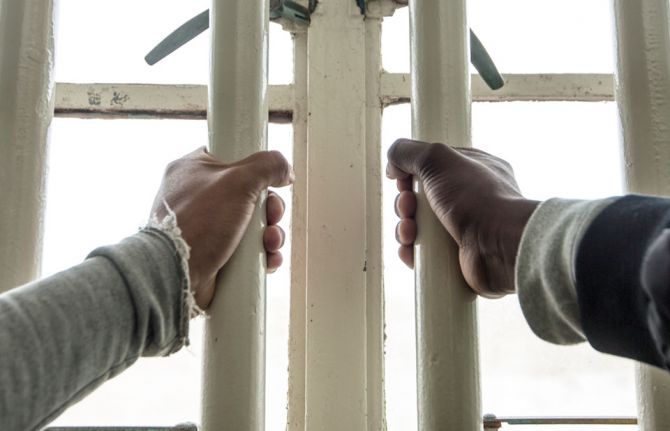
COVID-Blog
COVID-19: urgent need to enhance measures in Myanmar prisons and detention facilities to prevent outbreaks
10 April 2020
10 April 2020 10 April 2020Social activists and nongovernmental organizations have called upon the Myanmar Government to adopt immediate additional measures to prevent COVID-19 outbreaks in the country’s prisons, including the release of all prisoners with underlying medical conditions as well as those detained for non-violent offences.
The call to action, which contains a set of key recommendations and priority interventions, is the result of a collective process initiated by civil society organisations with technical guidance and inputs from UNAIDS, WHO and other organisations.
A joint United Nations letter, signed by UNAIDS, UNODC, UNDP and UNICEF, was also sent to the President of Myanmar on 9th April requesting the Government to take the necessary measures to release detainees from the country’s detention facilities in light of the COVID-19 pandemic and to protect the health and safety of those held in such facilities.

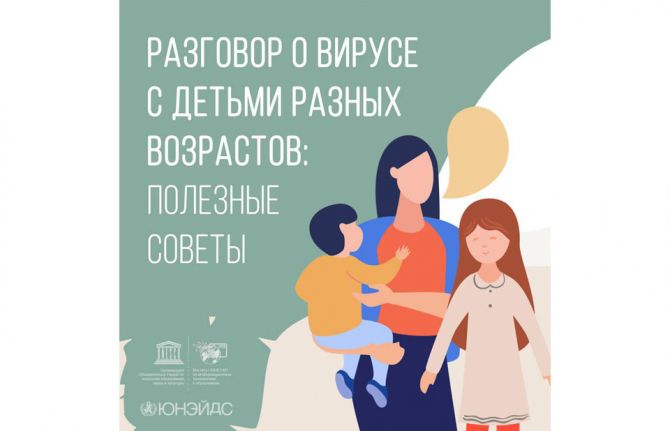
COVID-Blog
UNAIDS-UNESCO information cards
08 April 2020
08 April 2020 08 April 2020The UNAIDS regional office for Eastern Europe and central Asia together with UNESCO IITE have developed a set of information cards providing accurate and evidence-based information about how to communicate and overcome the coronavirus in family settings. The cards talk about how to prevent infection, how to talk about the virus and the current situation with children of different ages, how to work and study in isolation, and how to prevent and address COVID-19-related stigma and discrimination in a simple and clear language.
The cards, which are currently being translated into other regional languages, are intended to be disseminated through social media networks, ministries of education, youth media and other channels.


COVID-Blog
New innovations map to strengthen the response to COVID-19
08 April 2020
08 April 2020 08 April 2020A Coronavirus Innovation Map has been launched by StartupBlink together with the Health Innovation Exchange—a UNAIDS initiative to leverage the potential of innovations to improve the health of all—and the Moscow Agency of Innovations.
The map is a directory of hundreds of innovations and solutions globally that could support and strengthen the response to COVID-19, helping people to adapt to life during the COVID-19 pandemic and to connect innovators so they can collaborate on solutions.

COVID-Blog
UN Volunteers support joint COVID-19 response in Kenya
08 April 2020
08 April 2020 08 April 2020Edwin Opwora, a UN Volunteer with UNAIDS in Kenya, is part of the COVID-19 UN team embedded with the Kenyan government. He is based at the office of the government spokesperson, and tasked with collecting and disseminating timely, accurate and reliable information on COVID-19.
"We started by developing a communication strategy to guide our approach and key messages for dissemination," says Mr Opwora. "But as we were developing the communications strategy, I noticed that vulnerable populations, including people living with HIV, were not included. With support from UNAIDS colleagues, we revised it to ensure that vulnerable and disadvantaged populations were also included in our communication strategy," added Mr Opwora.
Mr Opwora volunteered to join the digital communications group, developing digital content and monitoring social media for fake news, myths and misconceptions. He also responds to frequently asked questions from the general public. Mr Opwora noted that initially, there was a lot of confusion because the public didn’t have enough information about the Coronavirus. However, with consistent dissemination of the right information, more Kenyans have become increasingly aware of the basic guidelines given by the government.
Winnie Wachiuri is also a UN Volunteer with UNAIDS, serving as a programme officer. "I am seconded to the Emergency Operations Center at the Ministry of Health to support data management and contact tracing. I mainly support evidence-based approaches to manage the COVID19 outbreak, and hope my inputs will contribute to containing and managing this pandemic," said Ms Wachiuri.
As #COVID19 cases increase in #Africa, UN Volunteers in #Kenya have been re-assigned to directly support the Kenyan Govt's response to the #coronavirus. Edith & Edwin, serving with @UNFPA & @UNAIDS, are two of these UN Volunteers. Read about their work! https://t.co/l6ooHn8HhC pic.twitter.com/5lJyn0Fb1i
— UN Volunteers (@UNVolunteers) April 8, 2020
